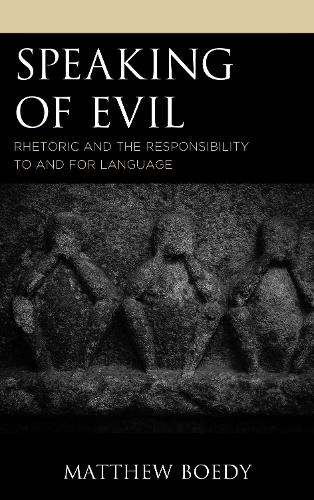
Speaking of Evil: Rhetoric and the Responsibility to and for Language
(Hardback)
Publishing Details
Speaking of Evil: Rhetoric and the Responsibility to and for Language
By (Author) Matthew Boedy
Bloomsbury Publishing PLC
Lexington Books
15th October 2018
United States
Classifications
Professional and Scholarly
Non Fiction
Communication studies
170
Physical Properties
Hardback
114
Width 159mm, Height 232mm, Spine 14mm
354g
Description
Rhetoric and the Responsibility to and for Language: Speaking of Evil relocates the problem of evil the question of why God would allow for the existence of eviland surveys it as a rhetorical problem. It raises this question: if we speak evil, how shall we speak of evil When we communicate, we are naming, and evil as the corruption of language plays a central role in that naming. Evil freezes our words, convinces us we have the sole right to their definitions, and generally stifles the dynamic gift of language. By looking at how people in different eras and situations have named evil, this book suggests how we can better take responsibility for our words and why we owe a responsibility to language as our ethical stance toward evil.
Reviews
Matthew Boedys Speaking of Evil argues that for rhetoric there is no beyond good and evil, and there never can be. Drawing on theological, philosophical, and critical lights ranging from Benjamin to Bonhoeffer and Agamben to Arendt, with illuminating essays on Isocrates and Erasmus, Boedy offers a thoughtful and wide-ranging argument for the ethical essence of rhetoric. -- Ned O'Gorman, University of Illinois
Boedy explicates evil's dwelling-unreflective places of stability. Rhetoric, at its best, intervenes via invention. Arendt equated evil with banality, extreme commonness. Those who resist learning from difference ignore the temporal home of the good. Boedy reminds us that evil inhabits the unexamined structures created by the good. Boedy reminds us that evil inhabits the unexamined structures created by the self-righteous. -- Ronald C. Arnett, Duquesne University, author of Levinas's Rhetorical Demand: The Unending Obligation of Communication Ethics
A necessary and purposeful and compelling work. Matthew Boedy explores the idea of an ethical rhetoric in a new and profound wayin the context of the problem of evil itself. The seriousness and conscientiousness of this book are palpable, and the books culminating challenge is unshakeable. -- James Crosswhite, University of Oregon
Author Bio
Matthew Boedy is assistant professor in the Department of English at the University of North Georgia.
